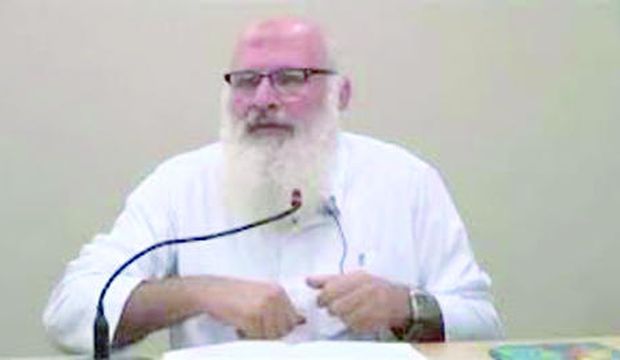
A undated photograph of Helmi Hashim, believed to be the Islamic State of Iraq and Syria’s (ISIS) top Shari’a judge. (Asharq Al-Awsat)
London, Asharq Al-Awsat—Four Egyptian men are at the heart of attempts by the Islamic State of Iraq and Syria (ISIS) to find religious justification for its bloody attempts to forge a new “caliphate,” a number of experts on fundamentalist movements told Asharq Al-Awsat on Saturday.
The sources said the four men formed the “core” of the group’s ideological leadership, and oversaw its attempts to administer its own brand of Islamic justice in areas under its control, despite having little education in mainstream Islamic scholarship.
They are Helmi Hashim (known as “Abdul Rahman Shakir Naamallah”), who hails from Upper Egypt and is the group’s main jurisprudential authority; ISIS’s head Shari’a judge Abu Muslim Al-Masri; another man bearing the same name, who is now believed to have been killed and who was the group’s main Shari’a judge in Aleppo; and Aboul Harith Al-Masri.
Hashim, the most influential on the list, is regarded as ISIS’s chief ideologue, and is the author of a book, The People of Cessation between Doubt and Certainty. In this work, he argues that since all “abodes” around the world, including Muslim-majority countries, are not truly “Islamic,” they are legitimate targets for armed violence, and the practice of takfir (declaring others to be infidels) should continue.
Hashism therefore declares those who have “ceased” in declaring others infidels and fail to spread the message of Islam are also infidels. ISIS, like other modern extremist takfirist groups, regularly labels other Muslims who do not follow its own doctrines infidels, including fellow Sunni extremists not fighting alongside them, such as the Al-Nusra Front, and followers of other Islamic sects, such as Shi’ites.
Yassir Al-Sirri, an expert on fundamentalist movements, told Asharq Al-Awsat that Hashim had been a police officer in Egypt who became radicalized after being removed from duty and jailed over links with individuals themselves linked to the murder of Egyptian president Anwar Sadat in 1981, and with whom he had been studying the Qur’an.
“Helmi Hashim Abdul Rahman Shakir Naamallah stands at the head of [the list of] takfirists from Egypt . . . He previously worked in the prison service before being removed from duty and imprisoned. He was born in Cairo on November 17, 1952, joining the Police College in 1970 and graduating in 1974, whereupon he joined the Central Security Forces . . . It was after that that he began to move towards religious extremism,” Sirri said.
During his imprisonment, Hashim met many jailed Islamists from a number of groups, including the Muslim Brotherhood. He was therefore able, Sirri said, to “take his pick” of whichever of these groups’ ideas were more palatable to him. After coming out of prison in 1983 Hashim then continued his studies, learning the principles of the Shari’a and Islamic jurisprudence and coordinating with other extremists of takfirist bent.
Sirri is adamant, however, that these four men should not be regarded as genuine religious scholars.
“The problem with these people is that they did not take their knowledge from those who actually have it [i.e. respected scholars]; they merely browsed a number of books and then went and declared some fatwas—without the proper knowledge. So they went astray [from Islam] and led others along with them,” he said.
One other member of this Egyptian group, known as “Abu Shua’ib,” left ISIS recently, and has been posting several videos on YouTube denouncing the group and its leader Abu Bakr Al-Baghdadi, as well as renouncing former fatwas he had issued during his time as a Shari’a judge for the group, the sources said.

Trackbacks/Pingbacks